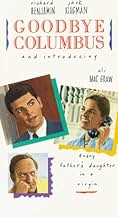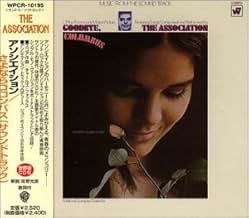Un diplômé et ancien combattant de la classe ouvrière a une liaison et se heurte à une jeune femme « nouveau riche », qui ne se soucie pas du contrôle des naissances ou de l'utilisation de t... Tout lireUn diplômé et ancien combattant de la classe ouvrière a une liaison et se heurte à une jeune femme « nouveau riche », qui ne se soucie pas du contrôle des naissances ou de l'utilisation de toute autre précaution pour éviter une grossesse.Un diplômé et ancien combattant de la classe ouvrière a une liaison et se heurte à une jeune femme « nouveau riche », qui ne se soucie pas du contrôle des naissances ou de l'utilisation de toute autre précaution pour éviter une grossesse.
- Réalisation
- Scénario
- Casting principal
- Nommé pour 1 Oscar
- 4 victoires et 9 nominations au total
- Uncle Harry
- (as Ray Baumel)
Avis à la une
For a modern audience to enjoy this film, you have to look at it as a period piece. After all, the film's tag line is "Every father's daughter is a virgin". You know you are not in 2004. Not all of the biting satire still holds, but the romance does. Both Ali MacGraw and Jack Klugman give very warm, appealing performances.
It is amazing how many thing have changed in the last 35 years...and how many thing haven't changed. An interesting film from a time when there were "good girls" and "bad girls" and a bride wearing white meant something.
The title is a reference to the brother, a basketball player at Ohio State in Columbus, who frequently listens to an OSU sports commentary that signs off with "Goodbye Columbus". And the song lyrics "Hello life, goodbye Columbus" relate to leaving the protection of home/school to face the world.
Although "Goodbye Columbus" is usually thought of as the "The Graduate" with a different ending, it is much more like "Adam at 6AM". The three films were made at the very end of the 1960's, all had a searching young man as their main character, and all revolved around a new romantic relationship. But in "Goodbye Columbus" and "Adam" the tension is not between different generations but between different backgrounds and values. In both the young man eventually realizes that these differences cannot be overcome and both films go out with shots of him leaving.
At the time of its release "Goodbye Columbus" was more dated than the other two more "with-it" movies, which at least acknowledge the counterculture changes that were taking place at the time. Ironically, 35 years later, its failure to incorporate these references make it the least dated of the three films.
The soundtrack album featuring "The Association" (and incidental music composed by Charles Fox) was probably the kiss of death for that group's credibility whatever their musical merits. While cool to be part of an outside film like "Easy Rider", it was uncool to be associated with a Hollywood product like "Goodbye Columbus". This was the summer of Woodstock and by then "The Association" had pretty much lost their audience. In addition to the title song they contributed "It's Gotta Be Real" and "So Kind To Me."
It's two most famous scenes have held up very well: the montage of Ali MacGraw swimming during the title sequence and the comical wedding guests "pig-out" at the buffet table.
This was the film that really introduced fashion model Ali MacGraw to movie viewers. She was 28 playing a 21 year-old college student. Much more believably than just a year later in the somewhat pathetic "Love Story". Physically MacGraw passes fine for a younger woman and being older probably helped her hold her own in scenes with the more experienced Richard Benjamin, Nan Martin, and Jack Klugman. She is excellent in this role and manages to stay accessible and genuine while also projecting poise, grace and beauty.
Benjamin's character is genuinely attracted to MacGraw but seems to maintain a healthy skepticism about the romance (along with pretty much everything in life). MacGraw's Brenda finds him attractive because of his differences but she is really her Daddy's girl and her rebellion is more playful than serious. The best scene is the father-daughter session at the wedding very late in the film. Jack Klugman character knows just the right buttons to push and it is at this point that you know the romance is truly doomed.
The cinematography is first-rate and while the widescreen DVD showcases this, it has been inexcusably trimmed to qualify it for a "PG" rating. The DVD version is only 101 minutes long. Entire sequences have been deleted including the critical first sex sequence where birth control methods are discussed (foreshadowing) and the sequence with the rationale for his moving in with the family for two weeks. Also missing is all the vaguely graphic elements dealing with her initial refusal to have sex. If you are a first time viewer watching the DVD version and find puzzling narrative gaps in the story or incomplete motivational explanations, the trimming is the reason. The trimmed sequences are on the "R" rated VHS, so to see this as intended (widescreen and uncut) you will need to buy both the DVD and the VHS and reconstruct things.
I also love Richard Benjamin as her unmotivated, anything but ambitious suitor, Neil Klugman. He is the antithesis of everything Brenda and her family epitomize. The dichotomy is that while he espouses supposed disdain for all they represent -- he is more than willing to be seduced.
There is a classic scene where Neil is stuffing his pockets full of grapes and is caught by the younger sister. He tries to hide the fact that his pockets are gorged with luscious fruit. But she calls him out on what he is doing.
The romance is a departure for Brenda. Neil, though Jewish, is a forbidden fruit of sorts. He is not ambitious or destined to be successful husband material. Therefore he is a completely inappropriate choice of suitor for Brenda. This of course makes him all the more attractive -- at least temporarily for Brenda who is rebelling against her mother.
Le saviez-vous
- AnecdotesRichard Benjamin said of Ali MacGraw: "The camera looks into your soul, and it looked into Ali's. Men loved her, women loved her. She was a real movie star."
- GaffesAt the dinner table, Julie is told that it is earlier in Columbus, where Harriet is calling from, than where she lives in New York. In fact both cities are in the same Eastern Standard Time Zone. In the book, Harriet is calling from Milwaukee in the Central Time Zone, which is correct. However, when the screenplay changed her location to Columbus, the writer failed to realize this fact and change the dialogue or the city.
- Citations
Brenda Patimkin: Are you serious?
Neil Klugman: I'm way the hell past serious: I'm suicidal.
- ConnexionsEdited into The Kid Stays in the Picture (2002)
Meilleurs choix
- How long is Goodbye, Columbus?Alimenté par Alexa
Détails
Box-office
- Montant brut aux États-Unis et au Canada
- 22 939 805 $US
- Durée1 heure 42 minutes
- Mixage
- Rapport de forme
- 1.85 : 1


























